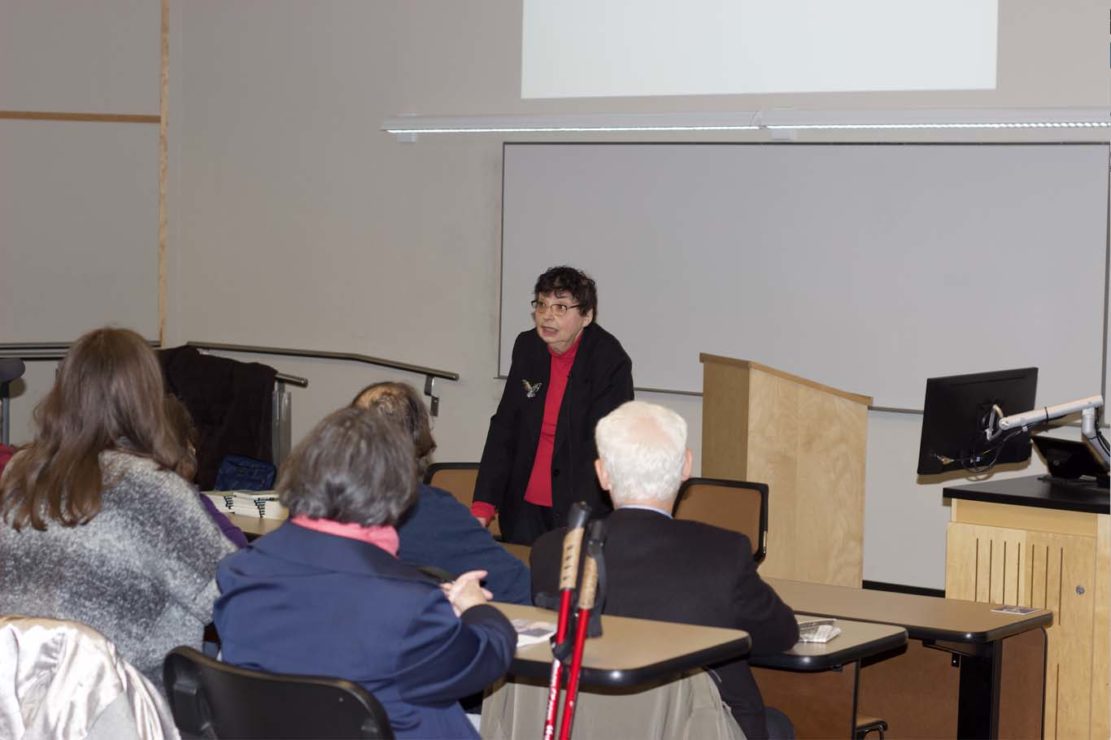
Inge Auerbacher is a woman with a commanding appearance. She has short, dark hair, red lipstick, and a large, sparkling butterfly brooch pinned to her jacket. She is a child survivor of the Czechoslovakian Theresienstadt concentration camp, but she is much more than that.
After Theresienstadt’s liberation and her family’s emigration to the U.S., Auerbacher grew up to become a scientist, human rights activist, and award-winning author. She holds an honorary Doctorate of Humane Letters from Long Island University and has multiple honours, including the Daughter of Shoah Woman of Valor award and the Ellis Island Medal of Honor. She is also a respected speaker worldwide, and in Jan. 2019, she addressed the United Nations during the UN annual Holocaust Remembrance Ceremony.
So, it was unsurprising that when Auerbacher came to UVic on Nov. 18, room A104 of the Bob Wright Centre was packed.
Auerbacher was introduced to the audience by Dr. David Zimmerman, professor of military history at UVic and head of the Victoria Holocaust Remembrance and Education Society.
“We can never forget what happened,” said Zimmerman. “Because [the Holocaust] must not be allowed to repeat. I know there are some people, unfortunately, who wish to forget. It’s important that we constantly remind ourselves, while we have survivors, it’s a wonderful thing to be able to bring them here to talk to people.”
“The weather is not very good to day,” Auerbacher said, as sheets of rain poured down outside and laughter rumbled through the crowd. “Perfect for my presentation.”
“I want to speak to you, as you know, about the Holocaust,” said Auerbacher. “A time when 11 million innocent people were killed — a better word would be slaughtered … Six million were Jews [and] among them one and a half million children, and those children looked just like me, like you, and it is for them that I speak all over the world to keep their memory alive.”
Auerbacher seated herself in a chair (she is, as she put it, 84 years young, turning 85 next month, but not rushing it) and, assisted by black and white photographs projected behind her, told the story of the first ten years of her life.
Auerbacher was born in Kippenheim, Germany on Dec. 31, 1934. By this time, President Hindenburg had died, and Hitler had declared himself the Führer of Germany.
“[Kippenheim was] a village of about 2 000 people and among them 60 Jewish families, and I’m the last Jewish child born in this village [before the war],” said Auerbacher. “We had a very good relationship together [and] lived side by side until things got bad.”
Auerbacher described her deportation to Theresienstadt when she was only seven years old. She faced hunger, squalor, and disease, and her battle with tuberculosis continued once her family emigrated to New York after the war.
The only doctor in the village was a Nazi party member, and when he came to Auerbacher’s mother’s bedside to deliver baby Inge, he was wearing his uniform.
“He was a good doctor,” said Auerbacher, “and he treated his Jewish patients with great respect. Later on he did some terrible things, probably the euthanasia program … After the war he was in prison for many, many years. I never saw him again.”
Auerbacher’s family was German and they gave her a very German name, “Inge.” Her grandparents were also German, and her grandfather stubbornly refused to leave Germany, the country of his birth, even once the situation for Jews deteriorated. Her father had been wounded fighting for Germany in the First World War, and won an Iron Cross for his service.
Jews had lived in Germany for centuries, but in September 1935 the Reich Citizenship Law declared Jews German citizens no longer, and instead racially separate German subjects.
Auerbacher described her deportation to Theresienstadt when she was only seven years old. She faced hunger, squalor, and disease, and her battle with tuberculosis continued once her family emigrated to New York after the war.
Othering and guilty bystanders were common themes throughout her speech. Her religiously Jewish family got on well with their non-Jewish friends and neighbours for years, but once the Nazis took over Germany, many of those people became either actively cruel, or bystanders who simply watched. Others chose to take whatever small action they could to help.
There will be no forgiveness from Inge Auerbacher for the Nazis who perpetrated the Holocaust — she says that is for God to do. But, she does believe in reconciliation, especially with the descendents of Nazis who had nothing to do with their parents or grandparents crimes.
“[Dr. Josef] Mengele comes from my home state,” Auerbacher said, “His son is a lawyer there. [Mengele’s] granddaughter was in a classroom where a friend of mine spoke. Now, I could embrace that child — she had nothing to do with it.”
Auerbacher even counts the descendants of notorious Nazis among her personal friends.
“I am Facebook friends with the grandson of [Rudolf] Höss,” she said, “the kommandant of Auschwitz, responsible for 1.1 million deaths. And he is fighting very much against what his family, you know, his grandfather did. And he writes very nice notes to me, and we’re good friends, yes. So, this is my reconciliation. But forgiving, no.”
As for today’s political landscape, Auerbacher is very concerned with the rise of anti-semitism, the hatred of “the other” going on in the world and about young people getting caught up in the hatred.
“Make. Good. Choices,” she said. “We are we. We are together on this journey… It’s very important to think [about] what you are doing.”






